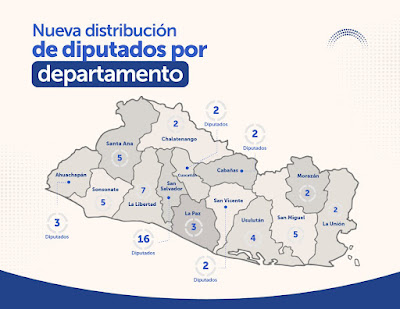Changing the rules of the game
On February 4, 2023, Salvadorans thought they knew the rules of the game for the coming national elections on February 4, 2024. After all, the country had a law on the books which stated that changes in the electoral process could not be implemented in the final 12 months before an election.
But on March 15, 2023, the Legislative Assembly repealed this provision in the election law. The repeal effectively allows changes to El Salvador’s electoral process to be made right up until election day. The strongest players in the game, president Nayib Bukele and the legislative deputies of Nuevas Ideas, gave themselves permission to change the rules for their upcoming election races at the last minute.Last night the Legislative Assembly controlled by Nuevas Ideas took advantage of its power to change the rules by adopting major modifications to the election of deputies to the Legislative Assembly, less than seven months before the first ballots are due to be cast. Bukele announced in a speech to the nation on June 1, that he wanted to reduce the number of seats in the Legislative Assembly from 84 to 60. Tuesday night, the Legislative Assembly acted to pass the necessary legislation to make those changes, with little debate and no advance hearings, study or public input on the matter.
An analysis by LPG Datos took the votes by political party in the 2021 legislative elections and applied them as if only 60 deputies were being elected rather than 84. Under that analysis, two opposition parties – Vamos and Nuestro Tiempo would lose their sole legislator. Nayib Bukele’s majority coalition would continue to have super majority control of the legislative chamber.
En una Asamblea de 60, estos 24 diputados no habrían entrado en 2021https://t.co/LDNkcyKykx pic.twitter.com/F7KQ1HgKSi
— Edwin Segura (@easegura) June 6, 2023
The new rules also modify the method used to allocate the number of seats each party obtains from votes cast within a department. The method newly passed is called either the Jefferson method (because it was first proposed by Thomas Jefferson), or the D’Hondt method (for a Belgian mathematician). In El Salvador, the change is described as changing from a system of “quotients and residuals” to one without residuals. The difference between the two methods is too complicated to describe here, but there is a lengthy description of the D'Hondt method in the article at this link, which concludes that this method offers an advantage to larger parties like Nuevas Ideas. (El Salvador's previous allocation method is referred to as the Hare quota method, and it is usually seen as more beneficial to smaller parties).
Again, using the 2021 election results, when you take into account the reduction in the number of deputies and the change in the allocation method, the result is that Nuevas Ideas goes from 67% of the legislative seats to 83% of the seats, and the number of political parties in the Assembly drops from 8 to 5, according to an analysis by Acción Ciudadana. If the allocation method is not changed, the percentage of seats controlled by Nuevas Ideas actually drops slightly to 62%.
Para los diputados, lo clave no es la reducción de diputados, sino el cambio de la fórmula. Este es el resultado más importante, desde mi punto de vista, del (excelente) estudio de @CiudadanaAccio1. Hay que comparar las tablas que yo he puesto dentro de los cuadros rojos. pic.twitter.com/0fbPiTmoS2
— Manuel 🇸🇻 (@manuelmlndzs) June 7, 2023
Another result of reducing the total number of seats in the Legislative Assembly is a reduction in the minimum number of seats allocated to the departments with smaller populations. The minimum number of deputies a department may have is reduced from 3 to 2. Thus the 6 least populated departments will all lose one deputy in the Assembly.
Presentamos a la @AsambleaSV la reorganización del sistema político-administrativo de El Salvador, una iniciativa del Presidente @nayibbukele para reducir a #44Alcaldías a nivel nacional y mejorar la toma de decisiones a favor de la población.
— Casa Presidencial 🇸🇻 (@PresidenciaSV) June 7, 2023
La Zona Occidental quedará así: pic.twitter.com/bhEDqrpTIx
Elección El Salvador 2021: cómo quedaron las alcaldías con los 262 municipios vs cómo hubieran quedado con los 44 municipios de Bukele.
— Manuel 🇸🇻 (@manuelmlndzs) June 7, 2023
Nuevas Ideas pasa del 58 al 93% de las alcaldías. Arena, PCN y PDC quedan con una alcaldía cada uno. FMLN, Gana y Vamos desaparecen del mapa. pic.twitter.com/J2x16eOqkZ
Election El Salvador 2021: how the mayoralties were with the 262 municipalities vs how they would have been with the 44 municipalities of Bukele.Nuevas Ideas goes from 58 to 93% of the mayors. Arena, PCN and PDC are left with a mayorship each. FMLN, Gana and Vamos disappear from the map.
The TSE also missed the June 3 date set by law for having a contract with a technology vendor to provide internet voting for Salvadorans in the diaspora. The 2024 elections will be the first Salvadoran elections with internet voting and there has not been a pilot project, or test run to show how internet voting would work securely and reliably.
The rules of the game in Salvadoran elections have been changed to favor those who write the rules. It is difficult to see these changes as anything other than a clear attempt to further concentrate power in the hands of Nayib Bukele and his allies, and marginalizing any political movement which might suggest another way is possible.

Comments